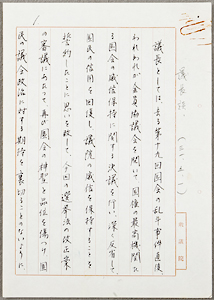HOME > Column > 9 Parliament in Brawl and Lament by Secretary General of House of Representatives
Parliament in Brawl and Lament by Secretary General of House of Representatives
The word 'parliamentary brawl' reminds us of recent incidents in South Korea and Taiwan, which have drawn large media coverage. Japan is no exception in this regard, with many such incidents reported in the country in the past. Japan's parliament was frequently thrown into confusion from 1954 (Showa 29), when the revision to the police law was an issue, to 1960 (Showa 35), when the issue over the Japan-U.S. Security Treaty dominated parliament.
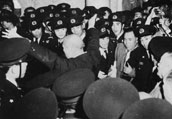
House of Representatives Speaker TSUTSUMI heading for chamber floor while being guarded by police officers. From "Me de Miru Gikaiseiji Hyakunenshi"
On 3 June 1954 (Showa 29), the Cabinet of Prime Minister YOSHIDA Shigeru decided to extend the duration of a Diet session in order to enact a bill to revise the police law. The bill included a provision that mandated the establishment of the current prefecture-run police system while disbanding the state-run regional police system and the municipality-run police system.
But deliberations over the bill were stalemated at the House of Representatives Committee on Rules and Administration. The bill finally passed the committee as its Chairman took a tough stance to push it through. The opposition camp led by the Japan Socialist Party, however, did not give up resisting the passage of the bill. Members of the opposition camp barricaded the entrance to the House of Representatives floor and occupied the seat of the Speaker in an attempt to prevent voting on the bill at a plenary session. The ruling camp challenged the opposition camp's move and tried to break the blockage, resulting in the parliamentary session being thrown into a brawl. The incident led Speaker TSUTSUMI Yasujiro to call the police. Guarded by about 200 police officers, Speaker TSUTSUMI proposed the extension of the Diet session for two days at the entrance to the House of Representatives floor. Acting on the proposal, ruling camp lawmakers stood up in agreement, leading to the passage of the proposal. The incident left 50 people injured. Consequently, the political parties involved received condemnation from various quarters, prompting the five major parties to issue a joint statement in which they pledged not to allow a similar incident to occur and cautioned themselves regarding the incident. The parties also declared in the statement that they would follow rules and laws while keeping their common sense, although there were differences in views over issues among the parties. In the statement, they also vowed to maintain political morale and do their utmost in order to eliminate the public's uncertainty over politics and regain their trust in politics-, which had been undermined by the incident-, as early as possible (YOSHIDA administration on downhill; 1955 system and HATOYAMA administration , by Nobuo Tomita; in Nihon gikai shiroku 4 (Parliament history in Japan, v.4) edited by Kenzo Uchida et al. Dai-Ichi Hoki Shuppan,1990). Parliamentary confusion did not cease in Japan, however.
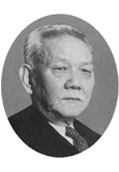
MASUTANI Shuji. From "Gikaiseido Hyakunenshi: Kokkaishi vol.1"
Immediately after the June 1954 (Showa 29) incident, Prime Minister YOSHIDA's long-running administration came to an end, followed by the inauguration of Prime Minister HATOYAMA Ichiro. The HATOYAMA administration clarified its confrontational stance against the opposition camp in a bid to bring Japan's post-war politics to a successful conclusion. Around the same time, the Liberal Democratic Party and the Japan Socialist Party were formed separately, marking the establishment of the so-called "1955 system"-Japan's long-running political system that started with the 1955 (Showa 30) realignment. Confrontation between the ruling and opposition forces became more conspicuous following the establishment of the 1955 system. In 1956 (Showa 31), the Cabinet submitted a bill for a single-member constituency system to the Diet. Following the submission of the bill, a plenary session was convened at the House of Representatives on 30 April, but discussion over the bill sparked confusion on the floor, soon leading to the session's adjourning. The following day, House of Representatives Speaker MASUTANI Shujiro returned the bill to a special committee inspite of opposition from the ruling camp, which prevented the Diet session from descending into further confusion. In a statement issued after the bill was sent back to the special committee, Speaker MASUTANI stated that it was needless to say that tolerance and perseverance were necessary in politics, since democratic politics was politics based on discussion, and winning people's trust was important for parliamentary politics. MASUTANI also said in the statement that parliamentary proceedings under Japan's two-party political system were facing their first test of ability, explaining: "We are not in an era in which power should be used for an early settlement of confused situations or for the sake of opposition." He then declared adamantly that an attempt to settle the situation at an early stage would plunge Japan's parliamentary-based political system, by which the fate of Japan and its citizens were determined, into crisis (Statement by House of Representatives Speaker (draft), shown in Papers of SUZUKI Takao). One month later, a session was convened at the House of Councillors to discuss the new education board bill. In the face of strong opposition from the opposition camp, House of Councillors President MATSUNO Tsuruhei requested a deployment of 500 police officers in the small hours of 2 June. As soon as the Liberal Democratic Party submitted a motion at the chamber's plenary session seeking an interim report on the issue, opposition party lawmakers tried to occupy the seat of the President. Nevertheless, guarded by the police officers, the President was able to approve the motion, leading to the bill's enactment.
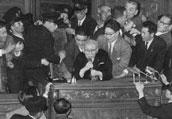
Speaker KIYOSE declaring extension of Diet duration. From "Me de Miru Gikaiseiji Hyakunenshi"
In a bid to revise the Japan-U.S. Security Treaty, the Cabinet of Prime Minister KISHI Nobusuke was even tougher in confronting opposition parties in parliament. In October 1958 (Showa 33), his Cabinet presented the Diet with a bill to revise the Police Officer Duty Execution Law in order to expedite the authorities' crackdown on anti-government action. The opposition camp challenged the ruling camp's move and tried to garner public support under a slogan in which the proposed revision to the Police Officer Duty Execution Law was derided as hindering the ability of police officers to enjoy dating. Opposition lawmakers, in an attempt to block the bill's passage, occupied the room of a relevant committee at the House of Representatives and locked up its Speaker in the room. The opposition camp's use of physical force was successful in precipitating the scrapping of the bill. But over the more important bill from the ruling camp to revise the Japan-U.S. Security Treaty, House of Representatives Speaker KIYOSE Ichiro deployed 500 police officers at the night of 19 May 1960 (Showa 35), and prevented opposition lawmakers from resorting to physical force to oppose the bill. As a result, the ruling camp rammed the bill through the plenary session, a political coup so famous that people remember it even to this day.
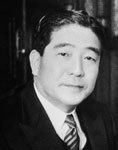
SUZUKI Takao (Collection of the National Diet Library)
SUZUKI Takao served as Secretary General of the House of Representatives and Deputy Secretary General, and steered Diet proceedings at a time when brawling was a matter of daily occurrence in parliament. In his diary, SUZUKI, lamenting his fate, wrote "How unfortunate I have am!" He continued, "I have been steering Diet proceedings that have no hope of reaching agreement between the ruling and opposition parties during the era of three Speakers - HOSHIJIMA (Niro), KATO (Ryogoro) and KIYOSE (Ichiro)." (Diary by House of Representatives Secretary General , shown in Chapter 6, Papers of SUZUKI Takao ).
It is true to say that brawling would plunge the parliamentary-based political system into crisis. But at least some of the politicians involved in past brawls tried to prevent such a crisis for the sake of the future of the nation and its people, although there were no prospects of the parties concerned reaching agreement. There is a view that Diet deliberations during those days were conducted more seriously than in other eras (Kentaro Fukumoto: Nihon no kokkai seiji (Japan's parliamentary politics) Tokyo Daigaku Shuppankai, 2000). Further study needs to be conducted on this view.
